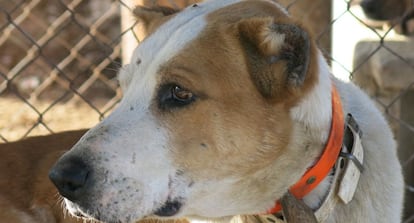Six vets and 26 hunters arrested in Huelva for mutilating dogs
Civil Guard raid finds animals with wounds caused by owners following “ancestral practices”


Twenty-six hunters have been arrested in the Andalusian province of Huelva for mutilating hundreds of dogs, whose tails and ears they sliced off with their own knives.
Six veterinarians are also being held in custody for allegedly issuing phony certificates to try to cover up the crude procedures.
“To see such clumsy mutilations of ears and tails, and especially to see veterinarians trying to cover it up, in our day and age, is frankly surprising. We’re talking about slicing animals’ ears right off,” said one source familiar with the case.
“It is cruelty without anesthesia, just to save themselves the vet fee. The owner is aware that the animal is suffering”
As a result of the mutilations, the dogs were left with open wounds that can take years to heal or never will.
The hunters’ goal was to save themselves the €40 charged by veterinary clinics for the operation.
By law, however, cosmetic surgeries of this nature have been banned in Andalusia since 2003.
The raid, named Operation Ears by the Civil Guard’s environmental protection department, Seprona, began a year ago.
Sources said they expected the number of arrests to rise to 50 among the community of hunters and pit bull owners in three different areas in Huelva.
After the environmental prosecutor’s office got involved, a court this week handed down a 10-month prison sentence to the first of the hunters, said sources familiar with the situation.
Most of the suspects have refused to give statements following their arrest, but privately asserted that cutting off their own dogs’ ears and tails is “an ancestral tradition” meant to prevent them from getting caught in the thorns of brambles. As such, they claim that they were simply following a rural tradition.
The Andalusian government’s health department and the regional council of veterinary associations have been cooperating with the Civil Guard to determine the responsibility of the six professionals involved in the case.
Since 2003, Andalusian laws have established that dog mutilation “for purely esthetic reasons or without any use, save that practiced by veterinarians” is a very serious breach of animal rights legislation. For years many Huelva hunters have traveled to vet clinics in the nearby region of Extremadura to bypass Andalusian legislation.
However, last year several hunters presented inspectors with dubious-looking Andalusian vet certificates, with a single document for more than one dog. Officers began investigating various zoological premises where hunters keep their packs, which are typically made of up 24 dogs.
Alfonso Aguado, president of the Spanish Association of Pack Dog Keepers, has hit back with a veiled threat of his own: “This is manifestly an unfair act by the Civil Guard. If people are being arrested for this motive, we feel that it is the authority which is placing itself outside the law. This is our starting point for any discussion.”
Sources said they expected the number of arrests to rise to 50 among the community of hunters and pit bull owners in three Huelva areas
Aguado admits that his association tries, though not always successfully, to get hunters to perform the ear and tail cuts “with sanitary guarantees.”
But he also spoke out in the hunters’ defense.
“We are expressing our protest because they’ve been treating us abusively. If it is dog welfare that they want, what [the Civil Guard officers] need to do is talk, instead of arresting dog pack keepers.”
Aguado also denies that cutting off the animals’ ears and tails is a cosmetic issue, and claims that mutilating their ears “benefits the dogs.”
But Huelva prosecutors confirm the seriousness of the abuse.
“It is cruelty without anesthesia, just to save themselves the vet fee. The owner is aware that the animal is suffering,” said a source at the prosecutor’s office.
The investigation shows that some of the dogs had very recent open wounds, urinary incontinence and fear of humans.
Economic favors for the vets
The suspect vets allegedly issued certificates to the hunters to try to give legal cover to the rudimentary surgeries. This represents a violation of ethical codes and criminal conduct in that they forged public documents. These individuals are also facing preliminary charges of cover-up and being an accessory to abuse.
In exchange for issuing these legal documents, the vets were allegedly rewarded by becoming the service providers for all animals at the premises, including microchips and vaccinations for all new pups. This represents unfair competition with regard to other veterinary surgeons who were respectful of the law, prosecutors argue.
Fidel Astudillo, president of the Andalusian Council of Veterinary Associations, said that the suspect vets will have their licenses revoked if they are found guilty by a court of law.
“The community of 3,700 Andalusian vets has an interest in clearing this up. If there are professionals involved, there is no reason why they should jeopardize the credibility of everyone else.”
English version by Susana Urra.
Tu suscripción se está usando en otro dispositivo
¿Quieres añadir otro usuario a tu suscripción?
Si continúas leyendo en este dispositivo, no se podrá leer en el otro.
FlechaTu suscripción se está usando en otro dispositivo y solo puedes acceder a EL PAÍS desde un dispositivo a la vez.
Si quieres compartir tu cuenta, cambia tu suscripción a la modalidad Premium, así podrás añadir otro usuario. Cada uno accederá con su propia cuenta de email, lo que os permitirá personalizar vuestra experiencia en EL PAÍS.
¿Tienes una suscripción de empresa? Accede aquí para contratar más cuentas.
En el caso de no saber quién está usando tu cuenta, te recomendamos cambiar tu contraseña aquí.
Si decides continuar compartiendo tu cuenta, este mensaje se mostrará en tu dispositivo y en el de la otra persona que está usando tu cuenta de forma indefinida, afectando a tu experiencia de lectura. Puedes consultar aquí los términos y condiciones de la suscripción digital.








































